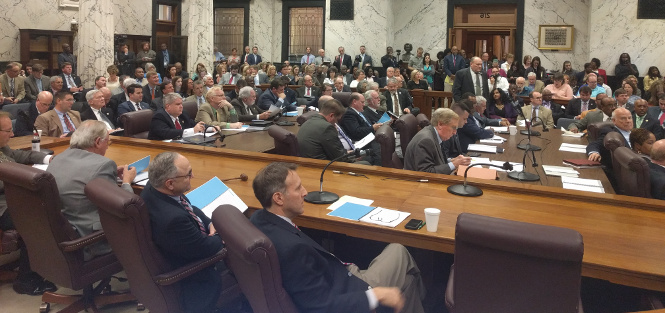JACKSON, MISS– Joint legislative education and appropriations committees met with the New Jersey non-profit EdBuild today to make suggestions on how to change the Mississippi Adequate Education Program (MAEP) formula.
EdBuild recommended the Weighted Student Formula over the current MAEP formula. EdBuild called the model “student-centered” and said it would create a more equitable funding system.
“This will smooth out large discrepancies in per-student funding between districts in the state,” said the report.
The “discrepancies” could be funded through increased property taxes in larger, suburban areas, according to the EdBuild recommendations.
EdBuild suggested that another way to pay for the proposed formula would be eliminate the current 27 percent rule.
“The rule has two highly negative outcomes. It creates that the state will bear 73 percent of all funding for education,” the report stated. “..And more problematic, this rule clearly biases districts that have a high property tax base, thereby providing more money than required by the formula, even before allowing for local flexibility to increase property taxes.”
The proposed formula requires more funding. For example, the appropriation per student allotted for base funding goes from $4,676 to $4,840 for the base funding.
“We are recommending a student-based funding formula,” said Sibilia. “It is a weight that is applied to enrollment.”
The weighted formula will calculate funds based on students, not on resources, according to Sibilia.
“It allows the public to allow the legislature accountable,” said Sibilia. “You will be able to figure out how much money is coming to your district compared to others with transparency.”
The proposed formula, according to Sibilia, would hold the legislature accountable of funding, and administrators accountable of how the money is spent.
EdBuild recommended a base funding of $4,694 and $5,250. The report suggested a starting point of $4,840 (near the center of this range), which could increase base funding by $164 or approximately four percent.
“This is a point of contention,” said Sibilia.
Low-income students would see a greater increase from $249 to $1,210 per student. Funding for low-income students should be targeted by evaluating student poverty estimates over the free-lunch eligibility figures, according to EdBuild’s recommendations.
“This count is an impartial, third-party estimate that should eliminate concerns related to inaccurate self-reporting of eligible students,” said Sibilia.
Another recommendation was to promote ongoing funding for students learning to speak the English language when it comes to getting a higher quality education.
“They’ll be able to break the poverty-level,” said Sibilia. “This is good for the students, and good for the state.”
Funding for students with special needs, according to the proposed formula, would be determined according to their diagnoses, not where they are currently educated, which is the current procedure.
Click here for the rest of the recommendations.
Lt. Governor Tate Reeves and Speaker of the House Philip Gunn made the following joint statement regarding the recommendations:
“We appreciate EdBuild spending countless hours over the last several months listening to Mississippians who are making a difference in the classroom – superintendents, school business officers, principals, teachers, parents and students,” Lt. Gov. Tate Reeves and Speaker of the House Philip Gunn said in a joint statement. “They heard concerns with the current model and the need to have a student-focused formula that invests more dollars into the classroom. We know that many of the recommendations can help us shape a brighter future for our children regardless of the zip code in which they live.
“We recognize the difficulty of the next stage of this legislative process, but we remain optimistic that our colleagues are ready to work together to make this happen,” they concluded.




